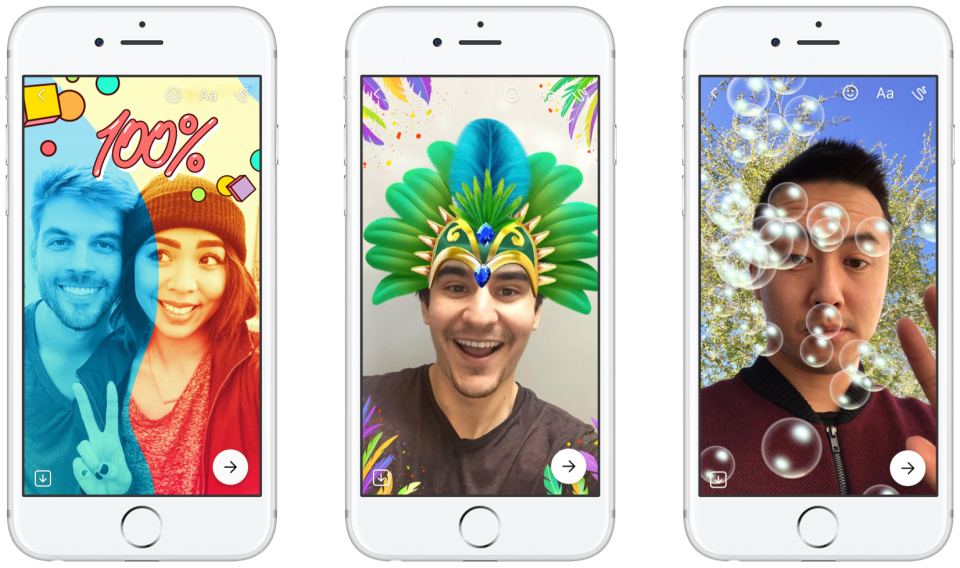Secure your place at the Digiday Media Buying Summit in Nashville, March 2-4
UK agencies see promise in Facebook’s latest Snapchat clone
With Messenger Day, Facebook has rolled out (yet another) Snapchat clone. Inside agencies, the announcement was initially met with eye rolls. But U.K. buyers say it has more to offer advertisers than they might expect.
Messenger Day was pushed out worldwide with Facebook’s latest update last week. Just like Snapchat, it allows users to share disappearing photos and videos that can be layered with 5,000 scribbles, stickers and other overlays reminiscent of Snapchat’s lenses feature. Though there are no ads in Messenger Day currently, they are coming — and will likely land between user posts just like Instagram Stories.
While the one-to-many product has a long way to go to prove it can work in Messenger’s one-to-one environment, agencies say there is potential for companies to insert themselves into people’s date planning via the platform — just like Google’s Allo product. An ad for a movie could slide into a group of friends planning a cinema date, for example.
“It’s about good SEO,” said Alistair Dent, iCrossing’s chief media officer, “When it is the right answer, I’m willing to pay to be the one who gets shown. And as it’s pull rather push-based, it’s less likely to annoy users.”

Another element of the new format agencies like is its viewability. According to Renée Mellow, MediaCom’s head of paid social, the format sits nicely with advertiser expectations around how long a video is seen, heard and the real estate it takes up on users’ phones. “Messenger Day is really brilliant in that regard. It’s out of the feed, so it’s not going to get swiped away. It comes with sound on and is 100 percent in-screen,” she added.
Another point for advertisers to take into account — and a point of differentiation from Snapchat — is that the Messenger Day functionality will slot into Facebook’s centralized ad ecosystem, which makes it easy to buy various ad units across its different platforms. Buying programmatically means brands won’t have to commit a large chunk of their budget to experiment here. While Snapchat has made progress in this area, its self-serve functionality remains in its infancy.
And, according to Erfan Djazmi, Essence’s director of mobile planning in Europe, cloned features do provide some efficiencies for both agencies and advertisers. “We will always welcome new components we know work on other platforms,” he said. “The benefit will come over time.”
Of course, there are caveats. One billion Messenger users now have Messenger Day, but that’s no guarantee they’ll use it in the way Facebook expects, or at all. While Snapchat is an entertainment environment, Facebook Messenger remains more of a private utility. “They might not be as receptive or do the same things across more than one platform,” said Gareth Price, head of insight at The Social Partners. Plus, they may not be receptive to brands on Messenger if their interaction seems out of context or invasive.
But with a reach and network effect as big as Facebook’s, it is difficult for agencies and brands to dismiss anything it does. Essentially, cloned or no, it gets a free pass.
“It’s the default these days because of the platform’s scale and reach,” said David Carr, strategy director at DigitasLBi. “It’s still the first thing on the plan. It’s where the growth is.”
More in Marketing

Thrive Market’s Amina Pasha believes brands that focus on trust will win in an AI-first world
Amina Pasha, CMO at Thrive Market, believes building trust can help brands differentiate themselves.

Despite flight to fame, celeb talent isn’t as sure a bet as CMOs think
Brands are leaning more heavily on celebrity talent in advertising. Marketers see guaranteed wins in working with big names, but there are hidden risks.

With AI backlash building, marketers reconsider their approach
With AI hype giving way to skepticism, advertisers are reassessing how the technology fits into their workflows and brand positioning.








